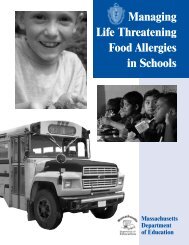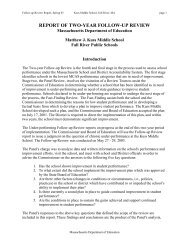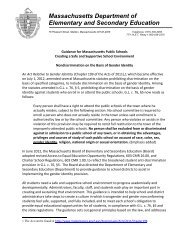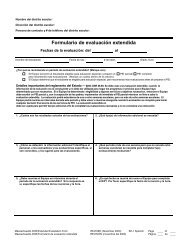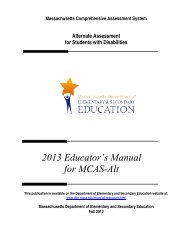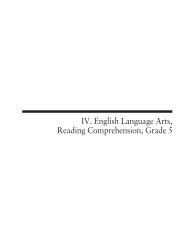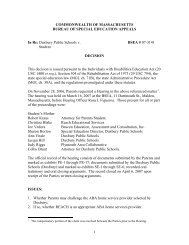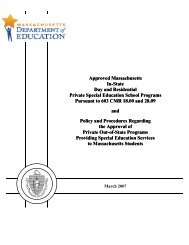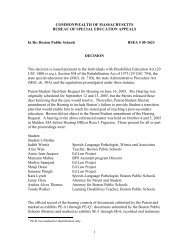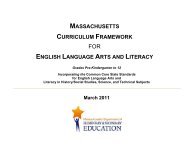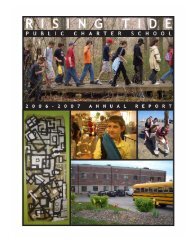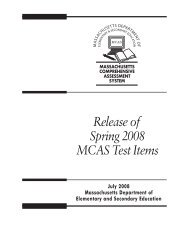Massachusetts Department of Special Education Appeals
Massachusetts Department of Special Education Appeals
Massachusetts Department of Special Education Appeals
Create successful ePaper yourself
Turn your PDF publications into a flip-book with our unique Google optimized e-Paper software.
33. The DEC team however did not feel that Student had a language-based learning disability<br />
because previous and current speech/language testing showed strengths in single word vocabulary, use<br />
<strong>of</strong> inference, rote memory and decoding, and he was able to use nonliteral language and enjoy humor<br />
and sarcasm. Student however did show language deficits because his impulsivity, disorganization,<br />
lack <strong>of</strong> self-reflection and concrete thinking for social situations were found to negatively affect his<br />
ability to find the words he wants, to think critically, make appropriate inferences, sequence his<br />
thoughts and get the “big picture” (S11, Warner).<br />
34. The DEC team also concluded that Student may not meet the criteria for NLD. The DEC team<br />
noted that:<br />
his [Student’s] visual-spatial skills were not weak and he did not have<br />
difficulty with mathematics. The other NLD criteria with which student<br />
does struggle include: poor pragmatic language skills, impaired reasoning<br />
and concept formation; a tendency to get lost in the details to the detriment<br />
<strong>of</strong> the “big picture”; and social–emotional difficulties which may include<br />
anxiety or depression. These issues could also suggest Asperger’s<br />
Syndrome. Some research has suggested that people with Asperger’s<br />
Syndrome typically have the neuropsychological characteristics <strong>of</strong> NLD,<br />
such that the two disorders may be interrelated. Again [Student] meets<br />
enough <strong>of</strong> the criteria for Asperger’s that his score on the Asperger’s<br />
Syndrome Diagnostic Scale is elevated, but he also manifests additional<br />
symptoms that are not generally indicative <strong>of</strong> Asperger’s.<br />
35. The DEC Team also concluded that student had average to above average cognitive ability and<br />
attributed lower testing scores to Student’s oppositionality (Warner). 12 Student showed no signs <strong>of</strong><br />
mania, delusions or thought disorder during the psychiatric interview, however, the DEC team felt that<br />
their observations and the clinical interviews showed that Student met the criteria for a clinically<br />
significant emotional disturbance (S11, Warner). During speech/language testing Student repeatedly<br />
asked to play “Chutes and Ladders”, a game typically enjoyed by younger children (S11). 13 The child<br />
psychiatrist noted that Student looked and acted like a younger child even though his conversation<br />
demonstrated relative strengths in language and abstraction (S11). The DEC Team also agreed that:<br />
“Student had a rigid and very fragile sense <strong>of</strong> self....He is suspicious <strong>of</strong><br />
others and hypervigilent and overly sensitive to the tiniest <strong>of</strong> slights.<br />
Sometimes his guardedness and suspicions may reach nearly paranoid<br />
levels... He has only the barest <strong>of</strong> controls on his behavior”.<br />
The DEC team also noted that:<br />
12 Achievement testing done by Commonwealth in July 2002 revealed average to above average skills in math and<br />
language arts (S9).<br />
13 Chutes and Ladders is geared for children ages 3-6 years.<br />
12



